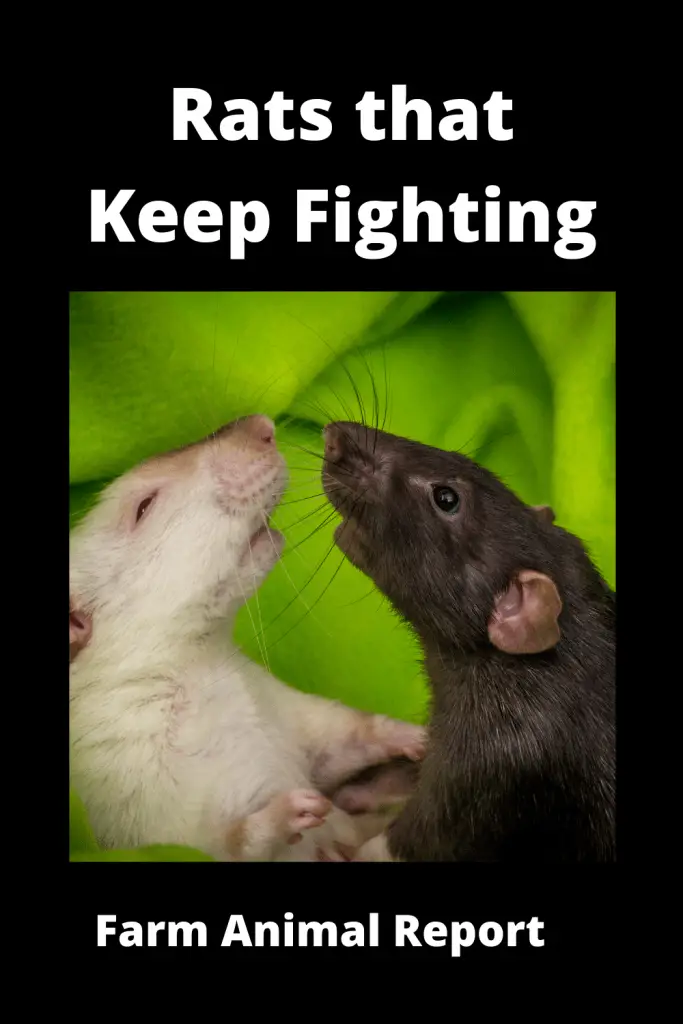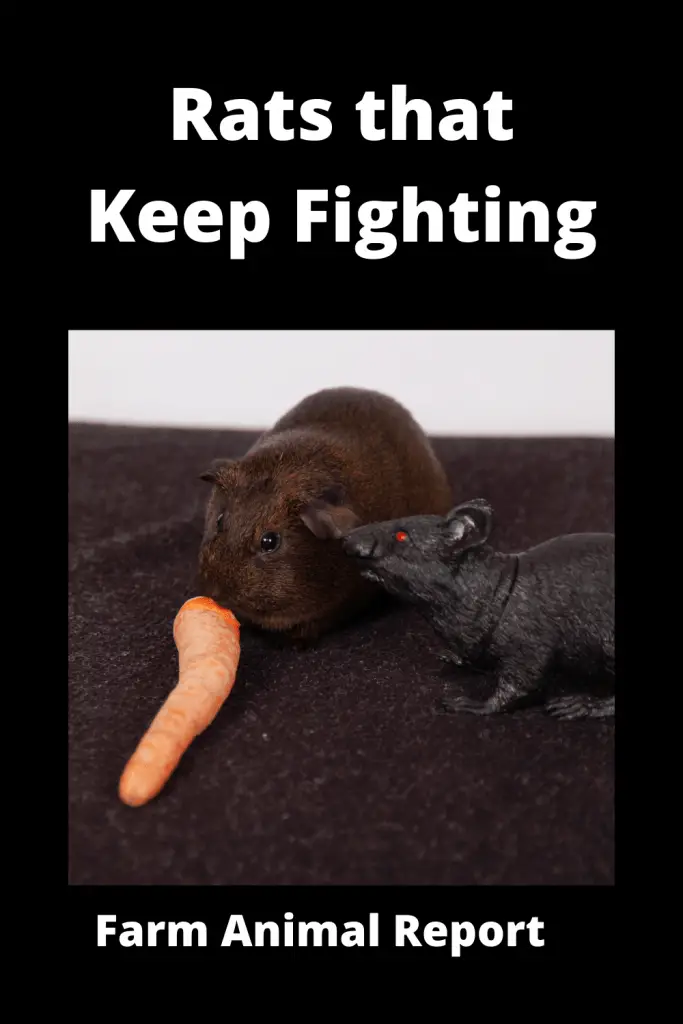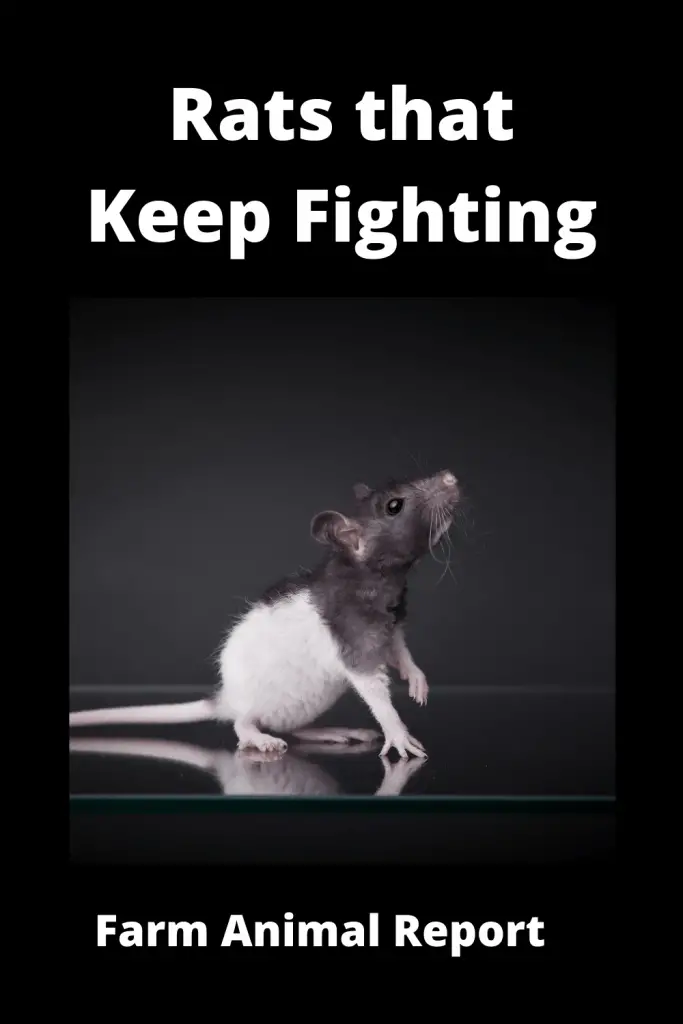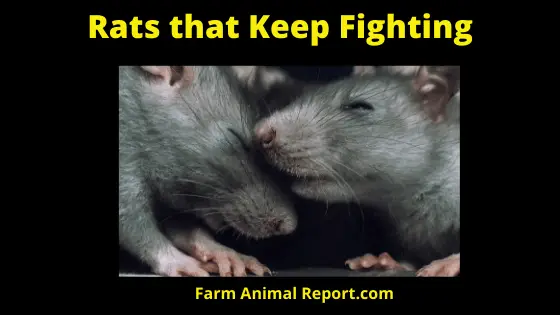Rats that Keep Fighting. The battle varies with the age and gender of the rats and from group to group. The fighting starts as lay fighting when the rats become old enough to begin interacting with their peers. Play fighting will help to train the rats for later life and is also a fun game for enthusiastic young rats. Some adult rats continue “Play fighting” into adult life.
This adult play fighting can differentiate from a severe fight from bouncy, playful approaches of the rats involved. It is not uncommon for rats to win a play match irrespective of their skills or situated in the pack and it can often turn into a lengthy grooming session.
This play-fighting among rats is more common in sibling groups than in mixed groups. The rats that grow up playing fight together often really stop under any circumstances.
Rats usually reach maturity at nearby 5-6 weeks of age; however, they arrive at social adulthood at around 5-6months of age. At this age, the male rats specifically begin to perform more violently toward each other.

The male rats move from inoffensive play, fighting to more severe adult aggressive. The winner of these fights will impose himself on the other associates of the colony. We humans call this “social dominancy.” Once this dominant hierarchy is established, it remains stable for a more extended period.
Rats that Keep Fighting / How do Rats attack Each Other
The play fighting involves the contact and defence of the backend. If a rat contacts the backside of the opponent, then he may try to grasp or bite it.
The rat usually seeks to defend his backside from attack by running away. The rat may also stand and look at the attacker and keep whisker-to-whisker communication with him known as “boxing, or by positioning on the back to hide the rear end. As long as the rat remains in space or his moustaches, teeth or body among the aggressor and his backside, he has higher chances to prevent the violence.
To counter the self-protective boxing strategy, the aggressor may drip to all four and creep forwards, and thus reach from place to place and impose a bite from the side. To counter the belly-up approach, the aggressor may lay upright on top of the supine rat and attempt to dig underneath him to get access to the rump of the rat.

Both domestic and wild rats contest using these approaches. However, the domestic rats are confined to the cages, therefore fight between domestic rats may accelerate more as fleeing is not possible.
There are more chances of fights between the resident rats and strangers or new rats introduced to the colony. The dominant rat who is resident of the cage presses maximum of the attacks, especially on male invaders. Female rats may also attack intruders. Violence towards new or stranger rats can be severe and sometimes fatal.
Reasons for Aggressive Behaviour
There are several reasons for the rats to become aggressive. These causes may include due to hormones as all the rats go through a teenage stage at around six months to a year old.
Hormones
In this age, the rat hormones can be overwhelming the rat, and this may lead to aggression. Another reason for rat aggression can be any sort of stress—the stress factors like loss of a friend, change in the environment, or sudden diet change.
Illness
The rat can be aggressive due to illness. If the rat is in pain, or unwell, then offensive behaviour will appear in rats. Some rats are hereditary aggressive. Some rats may release pheromones in the urine and these pheromones in males, mark out the territory of that male that provoke aggressiveness in other rats.
Both males and females can express aggressive behaviour. However, males are more prone to aggressive behaviour.
HOW TO DEAL WITH RAT FIGHTING: –
There are several things for dealing with the rat fight, and these are as follow:
PATIENCE:
Coping with the aggression of rats, or any other negative behaviour in the pets, the owner must have great patience and understanding. Changing any negative behaviour may take time and at the same time as the vanilla essence will help.

If the rats living in the colony and biting out of fear, then it is the responsibility of the owner to generate a trusting relationship with the pets.
The better way to develop a relationship with rats is by sitting next to the cage and let the rats sniff at the owner. Producing a relation with a rat may take time, but it is worth it in the end.
Spray with Water
To deal with the fights between the rats have a plant mister of water at hand. Spray the rats if they start fighting and if this doesn’t work then place a towel over them.
Homeopathy: Natural Methods
Another excellent tool to deal with rat fighting is through behavioural and health problems. Homoeopathy is a natural way of treatment, so there are no side effects of these medicines, but they do work.
The homoeopathy medicines are in granules form that has calming effects and will help to curb the aggression within a few days. These homoeopathy medicines will not affect the personality of the pet but do change their lives.
A Secret Weapon / Vanilla
A secret weapon to control rat aggression is vanilla essence. Applying vanilla essence at the base of rat’s tails and on the backs will help to control the aggressiveness of rats.
There is no harm if the rats lick each other. The scent of vanilla essence will cover up the smell of rats. In case, rats show aggression to the owner; then the owner must rub some of the vanilla essences on rats and some on their hands. In this way, both smell the same and rats will have a good relationship with the owner.
Preventing Stress
Reduction of stress can also have a positive effect to control the aggressive behaviour of rats. It is the individual responsibility of the owner to look after the rats. The owner must watch for any signs of illness.

Illness
The rats can become aggressive due to many diseases. The rat can also become aggressive if they have sudden environmental changes or if they lose any of their companions.
The owner must check the environment to make it comfortable for the rats. Add a companion as rats are very social animals, and they love to have another friend to snuggle up to, play with, and groom. Female rats are easier to introduce as compare to male rats.
A Final Possibility Neuter / Spay
Finally, after the use of everything and nothing helped to control the rat’s aggression, then it is time to neuter the rats. In male rats, the attack may be a cause by hormones and neutering will help to stop the extra hormones intensity around the rat’s little body.
Several studies are describing that neutering rats will stop the aggression in pets and make their life happier. After surgery, rats do need the owner help for a few days, and then the rats will trust you with minus aggression.
Rat Breeder Associations
| Rat Association | Location | Link |
|---|---|---|
| American Fancy Rat $ Mouse Association | United States | AFRMA |
| Rat & Mouse Club of America | Untied States | RMCA |
| National Fancy Rat Society | United States | NFRS |
| North of England Rat Society | UK | NERS |
| UK National Pouched Rat Society | UK | NPRS |


